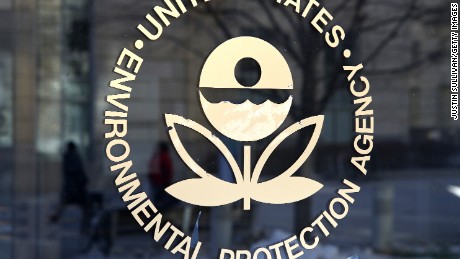(CNN)The Environmental Protection Agency is preparing a second overhaul to the way coal-fired power plants are regulated, a change to the Obama-era rule limiting mercury emissions that environmentalists have supported.
It follows the agency's proposal last week to shift the regulation of power plant carbon dioxide emissions from the federal government to states. The administration's Affordable Clean Energy rule would replace the Obama administration's Clean Power Plan, a central part of its efforts to combat climate change.
Details of the mercury rule have not been released, but agency spokeswoman Molly Block said the proposal "will soon begin the interagency review process," which "typically takes between 60 to 90 days." After that, the proposal will be made public and the agency will accept public comments, she said.
The current Mercury and Air Toxics Standards rule requires coal- and oil-fired power plants to reduce emissions of mercury, as well as arsenic, acid gas, cyanide, nickel, and selenium, which are linked to various cancers and diseases. It was finalized by the Obama administration in 2011 after a federal court struck down the Bush administration's regulation. Challenges to the Obama administration's rule eventually reached the Supreme Court, which largely upheld it.
The EPA statement specifically noted it is considering "whether and how to account for co-benefits," suggesting it is re-evaluating the Obama administration's justification that reduced pollution leads to decreased health care spending. That analysis had estimated $3 to $9 in savings for every dollar spent.
Mercury is a neurotoxin dangerous even in small doses, and is considered by the World Health Organization to be one of the top 10 chemicals "of major public health concern."
"Mercury may have toxic effects on the nervous, digestive and immune systems, and on lungs, kidneys, skin and eyes," according to the WHO. It can also impact the development of unborn babies and young children.
The largest industrial source of mercury pollution is power plants, according to the EPA.
News of the proposal prompted rebuke from environmentalists.
Sen. Tom Carper, a Democrat from Delaware and critic of the administration's environmental policy, called the proposal "particularly egregious, even by Trump standards." He recently proposed legislation to create a nationwide monitoring system for mercury.
Mandy Warner of the Environmental Defense Fund called the current rules "established and successful," and pointed to Obama administration projections that the rule would save between 4,200 and 11,000 lives every year.
Block, the EPA spokeswoman, said the "EPA knows these issues are of importance to the regulated community and the public at large and is committed to a thoughtful and transparent regulatory process in addressing them."




